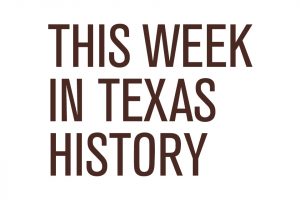To please an old pal and improve his standing in Texas, Alexander Le Grand accepted a dangerous assignment on Sep. 9, 1836 only to learn that making peace with the Indians was easier than squeezing money out of Sam Houston.
During his last days as interim head of the Lone Star Republic, David G. Burnet discovered that Mexican suitors were courting the Comanches and Kiowas. To avoid a clash with the warrior tribes he needed an expert in Indian affairs capable of turning potential enemies into valuable allies.
For this delicate mission Burnet selected a Santa Fe trader he had known for many years. A Baltimore dandy schooled for the legal profession, Alexander Le Grand gave up the easy life in 1823 for the rigors of the frontier. Spending months at a time on the perilous Plains, he was one of the few white men on speaking terms with the Comanches and their Kiowa kin.
Burnet did not have far to go to find his Indian diplomat. Soon after San Jacinto, Le Grand enlisted in the Texas Army and was serving as an aide to Gen. Thomas Rusk. Bored by the dull peacetime routine, he was more than ready for an exciting change of duty.
Burnet explained that as an “agent extraordinary” he would have full authority to negotiate a treaty on behalf of the Republic. If the aborigines could not be persuaded to take the Texans’ side against Mexico, their promise of neutrality would be sufficient.
Smugly confident the ignorant Indians, whom he called “imbeciles,” would do whatever he asked, Le Grand promised total success. Relieved by the pompous pledge, Burnet drew up the necessary papers, including a $1,200 letter of credit, and wished his emissary a safe journey.
Le Grand quickly left for New Orleans, where representatives of Texas’ interests in the United States coughed up the requested funds. After a short stay in the Crescent City, Le Grand departed for Indian Country.
That was Sep. 30. He evidently took his own sweet time on the next stage of the trip because Burnet heard nothing from him until the middle of November. Offering no other excuse than he had been “somewhat (unavoidably) delayed,” Le Grand predicted completion of his assignment inside 20 days.
But another month and a half went by before the dilly-dallying diplomat sat down with the Comanche chief Sheconey. After patiently listening to his spiel, Sheconey insisted that the treaty guarantee tribal hunting grounds. Caught off guard by the demand, Le Grand confessed that he could not include such a stipulation.
The Comanche nodded knowingly. The Mexicans had told him the Texans planned to steal the Indians’ land. Until he saw hard evidence to the contrary, the Comanches would remain the implacable enemy of the white race.
Bested by the “imbecile” and humiliated by his failure, Le Grand refused to return to Texas in disgrace. Instead he dropped out of sight, and for the next three months his whereabouts were unknown.
Le Grand finally surfaced in Nacogdoches in April 1837. Lacking the nerve to report in person to the new president, he broke the news to Sam Houston in a letter containing a long self-serving version of the events of the past seven months.
By November, Le Grand had had his fill of Texas. He resigned from the army and submitted a bill for his services endorsed by the secretary of war and supported by a statement from Burnet disclosing the details of his Indian odyssey.
Houston denied the request and across the voucher wrote, “This $1,200 are unaccounted for. He is not an officer in the army nor has he ever been. No pay is due him.”
Inflamed by the stinging rebuke, Le Grand took his case to the congress. He argued in an impassioned speech to the Lone Star legislature, “I have the right to demand relief from the oppression of a vindictive and capricious tyrant.” For dramatic effect, he recalled “the difficulties and dangers I encountered in traversing a pathless wilderness, where scarce a human sound was heard, save the shrill war-whoop of the savage, echoed by the death groans of his victim.”
Le Grand lobbied congress night and day for six months, and in May 1838 the senate and house passed a joint resolution recommending payment in full. But Houston vetoed the measure noting, “The individual did no duty, has received $1,200 and only sought to avoid duty, and lay drunk for months. He was a brag pet of President Burnet.”
Abandoning all hope of getting his due from Houston, Le Grand waited for the next administration. Though sympathetic to his plight, Mirabeau Lamar was in office five months before finally okaying the check.
In May 1839, Alexander Le Grand took the money and ran disappearing forever from the pages of history. He did, however, learn an important lesson.
In Texas talk was cheap. Deeds made the difference and the man.
Order Bartee’s books “Murder Most Texan” and “Texas Depression-Era Desperadoes” from the “General Store” at barteehaile.com or by mailing a check for $26.65 for each copy to Bartee Haile, P.O. Box 152, Friendswood, TX 77549.






